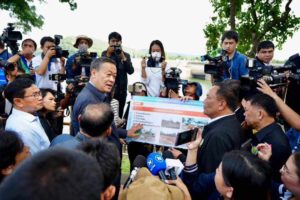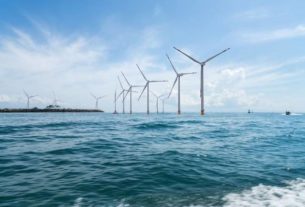 ‘Listen to the people’ – Thai PM’s push for water mega-projects triggers flood of concern
‘Listen to the people’ – Thai PM’s push for water mega-projects triggers flood of concern
Concerned Thais and environmentalists have expressed alarm at Prime Minister Srettha Thavisin’s support for a 2.2-trillion-baht water management project on the Mekong, Chi and Mun rivers.
“I hope the prime minister will not rush to give the project a green light. I really hope he will study the information carefully before making a decision,” said Asst Prof Sitang Pilailar, a water-management expert at Kasetsart University’s Faculty of Engineering.
She warned that the situation of the Mekong River is uncertain and threatened by China’s plans to build more dams upstream, with global warming could also reduce the river’s volume significantly.

“If the government jumps too fast to a conclusion, the huge 2.2-trillion-baht budget may be wasted,” the academic said.
Mega project in the making?
The idea of a mega project that would solve yearly droughts in the Northeast once and for all first emerged in 1991 during the government of General Chatichai Choonhaven. However, to fully implement such the Kong-Chi-Mun Project would require construction of infrastructure on a massive scale and an enormous budget to fund it.
Over the past few decades, only a small fraction of the water-management project has been built. For example, between 2004 and 2008 the government constructed dikes and canals channeling water towards irrigation systems. After General Prayut Chan-o-cha came to power in 2014, the government drafted more ambitious plans for Phase 1 of the project.
So, when Srettha took over as prime minister this month, the first phase of the mega project had already been clearly outlined. Under this phase, 1,894 million cubic meters of water would be channeled from the Mekong, Chi, and Mun rivers to the Ubolratana Dam in Khon Kaen province. This would expand the irrigated land in the Northeast by another 1.69 million rai.
Construction of the first phase is scheduled to take 11 years and would cover the provinces of Loei, Nong Bua Lamphu, Khon Kaen, Udon Thani, Nong Khai, Chaiyaphum and Kalasin. It would also require an estimated budget of about 150 billion baht.
“Investments in the agricultural sector such as the Mekong, Chi, Mun project or irrigation projects will be prioritized by the government. We have the budget to invest in the prevention of flooding and drought, which will help boost the country’s gross domestic product,” Srettha said during a recent visit to Khon Kaen.
Sitang commented that Srettha has endorsed the huge project with the hope of providing a long-term solution for the country’s water-related problems.
Caution required
However, water resources are a crucial part of people’s lives and livelihoods, so the government should consider holistic solutions that benefit humans and the environment together, rather than rushing into potentially damaging mega-projects, Sitang said.
“Look around carefully and you will notice that there are plenty of good models in the country. The government may need to think about encouraging farmers to dig ponds or create underground water-storage systems,” the professor added.
Sirisak Saduak, a coordinator for the People’s Network for Isan Basin, fears that Srettha’s recent visit to the Northeast was just a gesture ahead of the serious push for the first phase of the mega project.
“If his team has really studied the Northeast, it must know that huge water-management projects built by the government a few decades ago have caused big problems. For instance, the construction of several dams including Rasisalai Dam opened the door to droughts and floods in the Northeast,” he said.
The government’s water-management projects have failed badly because policymakers do not really understand local geosystems, Sirisak said. Centralizing water management has led to bad policies because the public has not been consulted. Policies like these lead to people being displaced and losing their land and livelihoods, including fishing and farming, he added.
“Gone is biodiversity and the rights of local people to manage their own resources.”
Sirisak insists that Srettha should first solve the problems left behind by old mega water-management projects, while scrapping the Kong-Chi-Mun Project. The latter project is not the right solution and will not be cost-effective, he said.
Full implementation of the Kong-Chi-Mun Project will cost the government 2.2 trillion baht, with a goal of increasing the Northeast’s irrigation zone by 31.78 million rai.
“Come to the Northeast and understand the region’s ecosystem, Sirisak urged. “Then you will see that there are many more ways to manage water resources, and alternative choices that can be taken to best suit the local context.”
Intervention by other authorities
The National Human Rights Commission (NHRC) has urged the Royal Irrigation Department and Office of the National Water Resources to review the necessity and feasibility of all four phases of the Kong-Chi-Mun Project.
Meanwhile, the project’s first phase is yet to receive a green light from the panel of experts tasked with examining its environmental impact assessment. The panel has asked to see more information on the project from the Irrigation Department and Office of the National Water Resources.
The NHRC said it has received complaints from many locals that they have not been given clear information on a project that threatens major disruption for their lives and livelihoods.
Concerns in the North
Like their compatriots in the Northeast, residents of the North are also dreading what will happen to their homes and villages in the face of a massive government water-management scheme. In the North, the focus is on the Yuam Water Diversion project, which involves construction of a dam, a huge tunnel through a mountain in Mae Hong Son, and a channel through forests in several provinces to reach the Bhumibol Dam in Tak.
“We are firmly opposed to this project,” said Wanchai Srinuan, a village head in Chiang Mai.
New PM Srettha also expressed support for this project during his recent visit to the North. His government has been briefed by several agencies about the increased risk of drought in the face of the El Niño climate phenomenon this year.
“We urge the prime minister to listen to the voices of the people who will be affected by this project. We have lived here upstream for generations. Over this long period, we have preserved the forests. But if the government goes ahead with this project, then these forests will be destroyed,” he said.
Wanchai also said that the environmental impact assessment for this project was conducted without public participation.
By Thai PBS World’s General Desk
Source: https://www.thaipbsworld.com/listen-to-the-people-pms-push-for-water-mega-projects-triggers-flood-of-concern/


